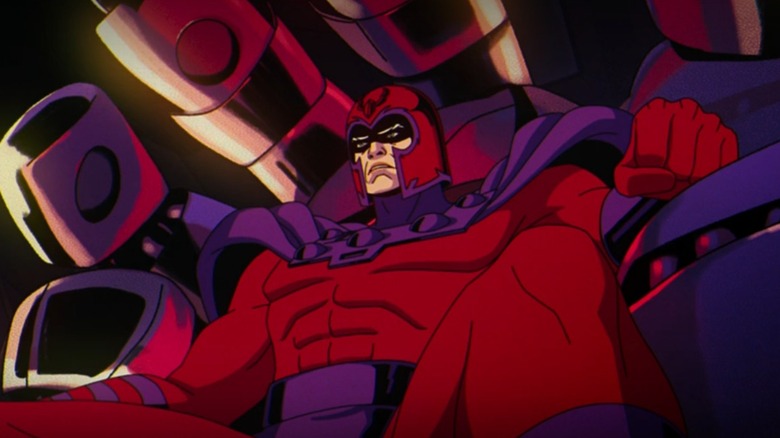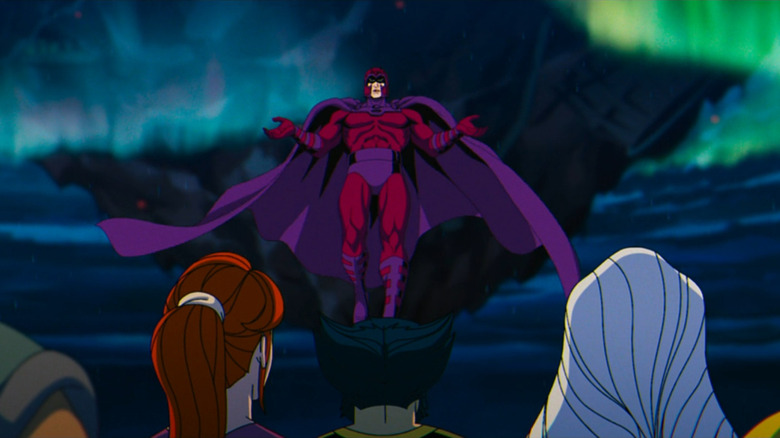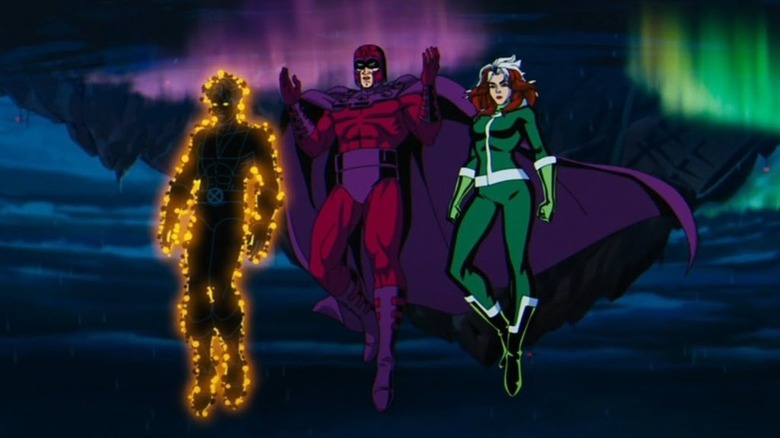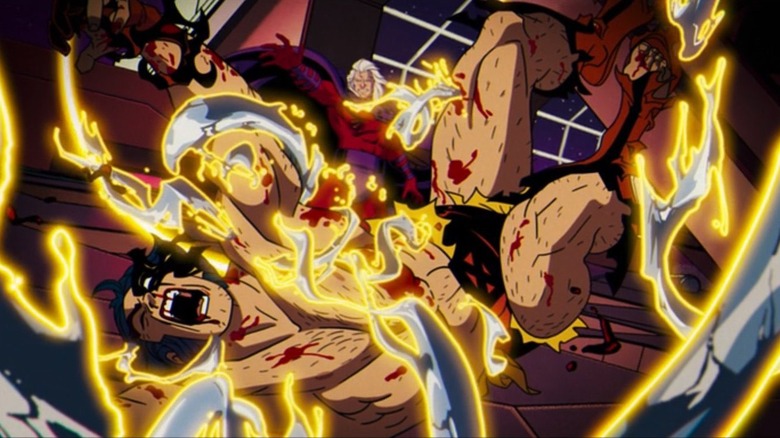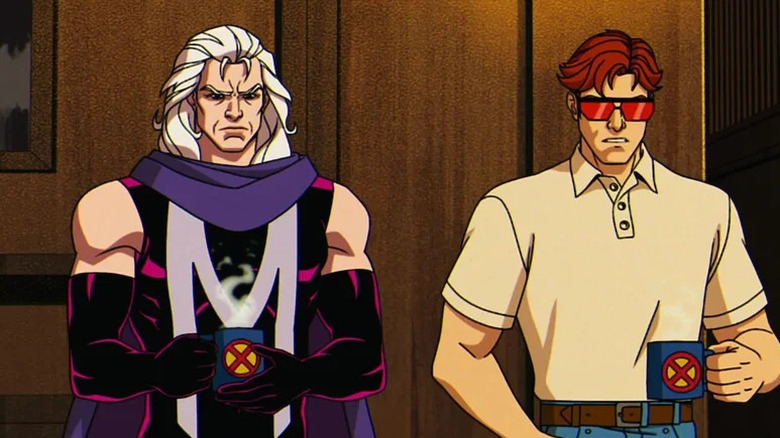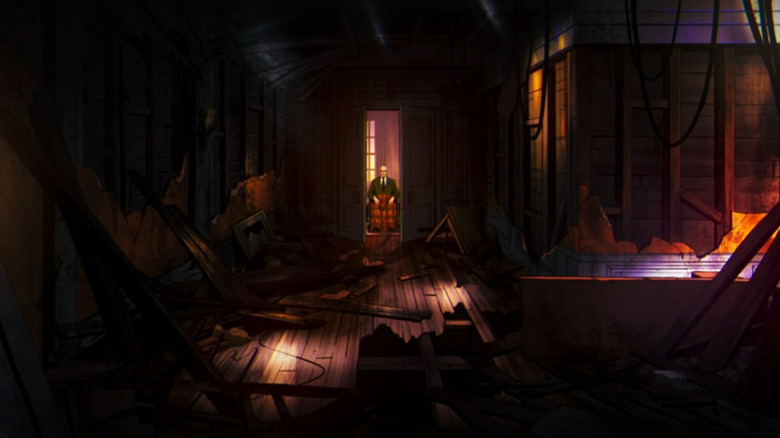X-Men '97 Just Took A Bold Swing With Magneto – And It Comes Straight From The Comics
Spoilers for "X-Men '97" to follow.
"I am trying to be better," proclaimed Magneto (in "X-Men '97" episode 2, "Mutant Liberation Begins") — "Please... do not make me let you down." He was speaking to a small United Nations panel, but addressing humanity as a whole. So, of course, mankind again forced his iron (controlling) fist.
As of episode 9, "Tolerance Is Extinction Part 2," Magneto is once more an antagonist to the X-Men (I won't say "bad guy"). He puts on his old red outfit, complete with the telepathy-blocking helmet (representing him shutting out Professor X's influence, literally and metaphorically). Regrettably, I don't think we'll be seeing Magneto back in the opening credits team line-up anytime soon, if ever again.
This heel U-turn is far from unmotivated, though. The season's Big Bad, Bastion, orchestrated the genocide of mutant nation Genosha (carried out in episode 5, "Remember It") and intends to build a future where human/Sentinel hybrids rule enslaved mutants. Magneto is a Holocaust survivor (a tragic backstory that "X-Men '97" has maintained). He's always refused to give tolerance a chance because that experience taught him coexistence as a besieged minority is impossible. Now, he's responding in kind to Bastion's first strike.
If you're an "X-Men" comics fan, you probably saw this coming — and recognize the beats of Magneto's plans from the 1993 arc "Fatal Attractions" (written by Fabian Nicieza and Scott Lobdell, drawn by several artists but especially brothers Adam and Andy Kubert).
X-Men '97 adapts Fatal Attractions
In "Mutant Liberation Begins," Magneto marvels at the beauty of Earth, but as the world has forsaken his kind, he now rejects the world. Tapping into the full extent of his powers, he unleashes a worldwide EMP (electromagnetic pulse) to fry all human technology and then resurrects an old plan.
In "X-Men" season 4 two-parter, "Sanctuary," Magneto created an off-world mutant haven on an asteroid — Asteroid M (it was destroyed thanks to his treacherous acolyte Fabian Cortez). In "Tolerance is Extinction," Magneto fashions a new Asteroid M from metal ore, calling it a replacement for Genosha. Magneto returning to his separatist ways is telling; he's convinced more than ever that humans won't let mutants live alongside them as a sister nation, so they must live apart from them. (On Asteroid M, Magneto also concocts a throne made from scrapped Sentinels, which is both unwasteful and a mission statement).
The EMP and Asteroid M come from "Fatal Attractions" — "Tolerance Is Extinction," so far, is combining that story with the 1997 arc "Operation: Zero Tolerance" (where Bastion and his plan come from). It's so fitting that "X-Men '97" is adapting comic arcs authored in the 1990s for its season 1 climax. These are stories that the original "X-Men" cartoon could have adapted if it got a sixth season back in 1997, not a delayed one 27 years later.
Magneto has been both a hero and villain in X-Men
Let's run through Magneto's comic history up through the 20th century. He debuted in 1963's "X-Men" issue #1 (by Stan Lee and Jack Kirby). He was a boilerplate villain through the 60s and 70s, until 1981. "Uncanny X-Men" #150 (by Chris Claremont and Dave Cockrum) revealed Magneto's tragic history and proved there was more to him than megalomania.
This culminated in "Uncanny X-Men" #200, "The Trial of Magneto" by Claremont and John Romita Jr. (a comic we recommended you read before "X-Men '97"). Professor X leaves Earth and entrusts his old friend with his school and dream. For the 1980s, Magneto remained mostly reformed and taught the New Mutants (during this time, Alan Moore even wrote a Magneto short story showing how difficult redemption can be).
During the 1990s, though, Marvel editorial dragged Magneto back into his old evil ways. It was solidified at the tail-end of the Claremont run in "X-Men" #275 when Magneto rejects Xavier's dream and kills an opponent. (This was also the issue that first teased a Rogue/Magneto romance — more on that soon.)
Once Claremont was forced off "X-Men" in 1991, Magneto was back to being the title's preeminent villain. "X-Men '97" just speed-ran this arc of failed redemption in nine episodes, culminating in this "Fatal Attractions" adaptation.
What happens in X-Men: Fatal Attractions?
In "Tolerance is Extinction," Magneto extends an offer to "[His] X-Men" to join him. Villains making such offers to the heroes are nothing new, but this one is effective because we've been watching Magneto fight alongside the X-Men in previous episodes:
"How many more of your bones will pave the way to Xavier's future, where we simper like beggars for tolerance? Your Professor's dream is dead. So I offer a new one."
In "Fatal Attractions," Colossus defects from the X-Men to Magneto; he is bitter towards humanity after his little sister, Illyana, was killed by an anti-mutant plague called the Legacy Virus. "Tolerance is Extinction" gives this role to Rogue, which makes perfect sense. She shares a romantic bond with Magneto and was with him on ground zero in Genosha, where her lover Gambit was killed. (Incidentally, the original "X-Men" cartoon also used Rogue as a substitute for Colossus during its adaptation of "The Dark Phoenix Saga" — Rogue may look like a demure bombshell but she's as strong as any tin man.)
Also joining Magneto is the team rookie, Roberto da Costa/Sunspot. He just had a terrible "coming out" experience with his mother (who urged him to hide being a mutant and handed him over to Sentinels), so he's susceptible to Magneto's rhetoric. This has precedence in the comics too; Sunspot was one of the New Mutants Magneto mentored.
The episode ends with the moment everyone remembers about "Fatal Attractions" — Magneto ripping out the adamantium coating Wolverine's skeleton (after Logan stabs him). This act, unlike Magneto's other moves in this episode, is pure sadistic overkill.
I hate that Magneto is a villain again — but there was no alternative
Earlier in the run of "X-Men '97," I was pulling for Magneto to complete his redemption. His masterfully written words in "Mutant Liberation Begins" struck me hard. Plus, frankly, I find I enjoy him more as a hero because, with the state of his world and ours, I find it increasingly hard to root against him. But his turn back to villainy was inevitable after the Genoshan genocide. With that massacre, everything Magneto had foretold was proven correct; mutants tried for peace and were killed in droves. The words he once preached became prophecy, so how could he not return to following them?
As disappointed as I feel, I think this works because Magneto's return to militancy is just another fallout of the larger tragedy. Genosha could have been a happy nation of mutant prosperity, but now it's gone and the lives can't be restored. The calamitous future facing mutants reflects the audience's investment in their story too.
The early episodes of "X-Men '97" suggested this could have been a story about healing and building bridges for humans and mutants to walk (Magneto choosing Xavier's dream was the surest sign of all). But in "Remember It," the season makes a sharp turn into horror and as former showrunner Beau DeMayo confirmed, this was to shatter both the X-Men and the audience's complacency. "X-Men" is a story about confronting prejudice, and discrimination (personal and institutional) is far from eradicated in the real world. It would've been dishonest for it to be conquered in "X-Men '97."
Magneto's arc may look like backsliding, but it works because we feel as betrayed as he does. We put faith in better angels and they let us down. Magneto's declaration of "Enough" in "Tolerance is Extinction Part 1" is the howl of our own frustration.
The folly of Professor X
Now we must come to Magneto's equal and opposite: Charles Xavier/Professor X, who even in "Tolerance is Extinction" preaches the need for dialogue. Xavier's dream is idealistic, but remember that its dreamer is a man of privilege. He's a wealthy white man born into ease; his disability and his mutant powers came later in life, so he knows what it's like to be a human in a world of comfort.
Professor X advocates for mutant acceptance into the human world because that's a world he knows well. In Magneto's youth, he experienced evil and harsh realities Xavier was sheltered from, so his ideology was forged in that fire. The 2011 prequel film "X-Men: First Class," depicting the origins of Charles and Erik's feud, understands this. It even begins with their respective childhoods; Charles in a Westchester estate, and Erik in Auschwitz.
As Sunspot notes, Bastion didn't brainwash his Prime Sentinels into being bigots, he just gave them tools to act on it. Earlier in the season, the anti-mutant Friends of Humanity was still active too. Xavier's faith in humanity has been unrewarded, so why not join Magneto's crusade if you're a mutant? Tellingly, Xavier prioritizes restoring the Earth over keeping Bastion's Sentinels down. (Cyclops, who showed frustration with the slow shaping of tolerance in "Remember it," disagrees — a sign of further divides?)
Jude Jones, writing for ComicsXF in 2021, deconstructed the fallacious idea that Professor X represents Martin Luther King Jr. and Magneto is Malcolm X. He proposed an alternative analogy: Magneto is Nat Turner (an enslaved African-American who led a revolt in 1831 Virginia) and Professor X is Booker T. Washington (a 19th-century African-American intellectual who argued Black people must prove their worth).
When the privileged call for patience, do well to remember how long the oppressed have been waiting.
"X-Men '97" is streaming on Disney+, with the season 1 finale scheduled to premiere on Wednesday, May 15.
